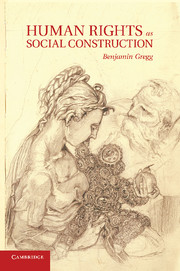Book contents
- Frontmatter
- Contents
- Acknowledgments
- Introduction
- Part I This-Worldly Norms: Local Not Universal
- 1 Human Rights
- 2 Human Rights
- 3 Generating Universal Human Rights out of Local Norms
- Part II This-Worldly Resources for Human Rights as Social Construction
- Part III This-Worldly Means of Advancing the Human Rights Idea
- Part IV Human Rights, Future Tense: Human Nature and Political Community Reconceived
- References
- Index
- References
2 - Human Rights
Political Not Metaphysical
Published online by Cambridge University Press: 05 January 2012
- Frontmatter
- Contents
- Acknowledgments
- Introduction
- Part I This-Worldly Norms: Local Not Universal
- 1 Human Rights
- 2 Human Rights
- 3 Generating Universal Human Rights out of Local Norms
- Part II This-Worldly Resources for Human Rights as Social Construction
- Part III This-Worldly Means of Advancing the Human Rights Idea
- Part IV Human Rights, Future Tense: Human Nature and Political Community Reconceived
- References
- Index
- References
Summary
In common usage, validity might be predicated of claims, possessions, or justifications – but not of rights. I challenge this usage even as I build on it. When I speak of the possible validity of human rights, I refer to human rights as claims that justify how humans should be treated. To make a human rights claim is to regard that claim as valid, as a claim to validity, as a validity claim. In this sense, human rights are widely regarded as universally valid a priori, as we saw in Chapter 1 with respect to theologically based conceptions. There I asked: How are valid human rights possible – independent of historical contingency and the perspectival qualities and contextual dependencies of human understanding, experience, and belief? In this chapter I ask the same question – How can human rights be valid? – but now with regard to metaphysics. The project of metaphysics began in earnest with Plato: through contemplation, it is the project to uncover true being, deeper truths, higher laws beneath, behind, above, or within the contingency, contextual embeddedness, and mere perspectivalism of our everyday phenomenological world. Metaphors such as “deeper” and “higher” point to essences, eternal and unchanging, that mark “true being.”
The tendency to prefer an unchanging, infinite universe in endless time is reflected in the metaphysical assertions of eternal, unchanging fundamentals or essences of things or ideas or values. The fact that, until the twentieth century, no one (not even Einstein) could even imagine that the universe is expanding may reflect the widespread and tenacious tendency to metaphysical thinking. Contemporary cosmology, which is naturalistic rather than metaphysical, teaches that space and time are finite (even if they are without edges or borders) and that everything in the universe, like the universe itself, is changing constantly. From this naturalist standpoint, nothing is eternal and nothing is unchanging. The cultural spheres of law, morality, and ethics (spheres relevant to human rights) are, of course, unlikely to be a realm of absolutes in an otherwise non-absolute universe.
- Type
- Chapter
- Information
- Human Rights as Social Construction , pp. 37 - 61Publisher: Cambridge University PressPrint publication year: 2011

